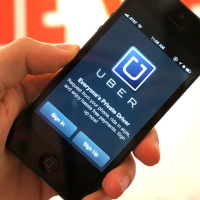Sharing-Economy on Alert: Uber Driver Declared Employee, not a Contractor

Does having a boss make a worker an official employee, entitled to the benefits and protections authorized by law?
That question—mumbled about by workers for decades as a new business model transformed them into “independent contractors”—has been bandied about in the judicial system lately, more often than not to the distress of business interests.
On Tuesday, it was Uber’s turn.
The California Labor Commissioner ruled in a case (pdf) that Uber owed driver Barbara Ann Berwick of San Francisco $4,152, mostly mileage money and toll costs, because the law says company employees get reimbursed for stuff like that. Uber lost the argument that the company was just an app developer and the drivers were independent contractors.
For now, the ruling applies only to Berwick. The commission, which is in the state Department of Industrial Relations (DIR) Division of Labor Standards Enforcement, has limited reach. But Uber appealed the decision, which sends it to San Francisco County Superior Court for review. A decision there could set a precedent.
The haggling is over whether Uber exerted sufficient control of workers to be considered their employer. Uber argued it did very little. The company didn’t set a minimum of driver trips, and didn’t control the hours worked. The commission disagreed:
“Defendants hold themselves out as nothing more than a neutral technological platform, designed simply to enable drivers and passengers to transact the business of transportation. The reality, however, is that defendants are involved in every aspect of the operation.”
The commission cited, as examples, Uber’s performance of background checks on workers, and its requirement that they submit Social Security numbers, a California driver’s license, a personal address, bank information and proof of insurance. Uber controls the tools they use―it’s got to be an iPhone and the car can’t be more than 10 years old―and encourages passengers to rate drivers. The ratings are used in determining whether the drivers can continue to participate.
Drivers were encouraged not to take tips because it wasn’t consistent with Uber’s advertising and marketing strategy. Uber sets the price of a trip and pays the drivers a non-negotiable fee. The commission cited precedence in asserting drivers are “an integral part of the regular business of the employer” rather than “an independent business or professional service.”
All a worker has is their intellectual property and a car, the commission wrote. Uber, recently valued at $50 billion, does not pay drivers for maintenance of their vehicles. The commission said they should.
The Labor Commission is hardly the only venue for complaints about Uber’s employment practices. There are two class-action lawsuits in Northern California and challenges around the world, in courts and from regulators. Uber claims to have business in 150 U.S. cities and 55 countries. The company’s valuation is higher than General Motors and Ford.
Uber is part of the “sharing economy,” which includes Instacart, TaskRabbit, Handy, Lyft and myriad startups in a range of industries. Some are labor intensive, so there is much talk of the Uber/Berwick case being an important stand against the misclassification of employees as contractors. And earlier in the week it was announced that FedEx reached a $227-million settlement with drivers it classified as contractors.
But easily more than a third of the nation’s workers have been labeled independent contractors, many questionably, to the collective shrug of the nation. How many lives were actually changed after Spearmint Rhino Gentlemen’s Club in Oxnard, just outside of Los Angeles, settled a class-action lawsuit (pdf) in 2012 for $12.9 million with strippers who claimed they were illegally classified as contractors?
–Ken Broder
To Learn More:
California Says Uber Driver Is Employee, Not a Contractor (by Mike Isaac and Natasha Singer, New York Times)
California Labor Ruling Deals a Blow to Uber’s Strategy for Denying Drivers Benefits (by Alan Pyke, ThinkProgress)
Was This Uber Driver an Employee? Yes, Says California Labor Office (by Christine Mai-Duc and Tracey Lien, Los Angeles Times)
Fight over Ride-Share Companies, like Lyft and Uber, Shifts to Courts (by Ken Broder, AllGov California)
Barbara Ann Berwick v. Uber Technologies, Inc et al (California Labor Commission) (pdf)
- Top Stories
- Controversies
- Where is the Money Going?
- California and the Nation
- Appointments and Resignations
- Unusual News
- Latest News
- California Forbids U.S. Immigration Agents from Pretending to be Police
- California Lawmakers Urged to Strip “Self-Dealing” Tax Board of Its Duties
- Big Oil’s Grip on California
- Santa Cruz Police See Homeland Security Betrayal in Use of Gang Roundup as Cover for Immigration Raid
- Oil Companies Face Deadline to Stop Polluting California Groundwater





